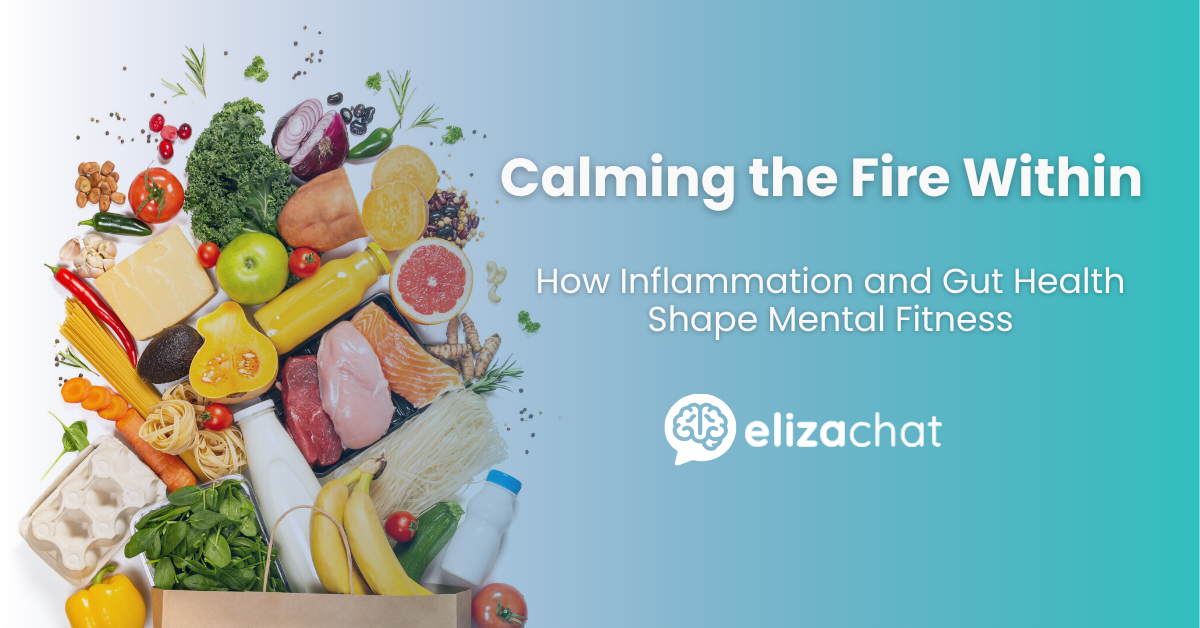Calming the Fire Within: How Inflammation and Gut Health Shape Mental Fitness
Modern life runs hot.
Fast food, fast schedules, fast everything. But under the surface, a quieter fire is spreading. It’s not just stress or exhaustion. It’s inflammation, and research now shows it may be silently influencing how we think, feel, and perform every day.
In a recent episode of The Mental Fitness Podcast, nutrition and mental health expert Dr. Sam Wiss joined us to explore how inflammation, gut health, and mindful eating all connect to our state of mind. His message was simple: if you want a clearer head, start by healing what’s below the neck.
The Hidden Link Between Gut Health and the Mind
The gut and brain are in constant conversation. This “gut-brain axis” is made up of nerves, hormones, and bacteria that signal mood, motivation, and focus. When inflammation builds up in the digestive system, those messages get distorted.
Dr. Wiss explained that chronic inflammation can travel through the body and even cross into the brain, disrupting mood regulation and creating symptoms like anxiety, brain fog, and low motivation. This process, known as psychoneuroimmunology, shows that mental clarity isn’t only psychological, it’s biological.
What fuels that inflammation?
Highly processed foods, poor sleep, constant stress, and erratic eating patterns all fan the flames. When we rely on convenience meals or skip meals entirely, we make it harder for our gut to maintain balance, leading to energy crashes, irritability, and restless nights.
The Processed Food Problem
Ultra-processed foods aren’t just calorie-dense. They’re information-dense for the body, packed with additives, oils, and sugars that confuse our natural signals. The body responds as if under attack, triggering low-grade inflammation that can affect brain chemistry.
The research is clear: inflammation from poor diet has been linked to higher rates of depression, anxiety, and fatigue. Yet the story isn’t about guilt or restriction. It’s about awareness.
Dr. Wiss encourages a shift toward what he calls “real food,” rich in color, texture, and nutrients. Think of food not as a reward or a rulebook, but as training for your brain. The more colorful plants, proteins, and healthy fats you add, the more you’re feeding the bacteria that keep inflammation low and energy high.
When We Eat Matters as Much as What We Eat
Inconsistent eating keeps the body guessing, which adds to the stress response. The body performs best with predictable rhythms such as regular meal times, consistent sleep, and moments of rest. This is why mindful eating starts with structure.
You don’t need a complicated plan to begin. Simply aim for consistency. Eat breakfast within an hour of waking up, space meals evenly through the day, and give your body enough time to digest before bed. Regularity tells your nervous system it’s safe, lowering stress hormones and improving mental focus.
Mindful Eating: The Antidote to Food Anxiety
We often forget that how we eat shapes how food affects us. Eating in a rush or scrolling through screens while we eat keeps the brain in fight or flight mode. The body can’t digest properly when it thinks it’s under threat.
Try this: once a day, have a distraction-free meal. Take a few deep breaths before your first bite. Notice the colors, textures, and smells. Chew slowly. Feel what it’s like to actually taste your food. This single act of attention calms the nervous system and strengthens your mind-body connection.
As Dr. Wiss noted, “Most people don’t know how good they could actually feel.” Mindful eating isn’t a trend. It’s how we restore the natural dialogue between mind and body that modern life keeps interrupting.
Training Mental Fitness from the Inside Out
Mental fitness isn’t only about meditation or mindset, it’s also about metabolism. When we calm inflammation through consistent, nutrient-rich, mindful eating, we’re not just improving physical health. We’re building mental endurance.
A nourished gut supports a steady mood. Lower inflammation sharpens focus. Mindful meals create micro-moments of calm that ripple through the rest of the day. It’s a full-circle practice of caring for the body to strengthen the mind.
Takeaway
Start small.
Choose one thing from Dr. Wiss’s three-part framework:
- When to eat: keep a consistent rhythm.
- What to eat: choose real, colorful, minimally processed foods.
- How to eat: slow down and stay present.
Over time, these simple acts quiet inflammation and restore balance. You’ll feel it first in your gut, then in your mind, and eventually in your entire outlook on life.
.svg)
